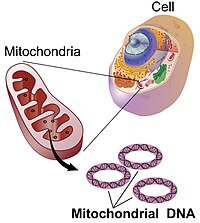
Photo from wikipedia
Background and Objectives We report the pathogenic sequence variant m.5789T>C in the anticodon stem of the mitochondrial tRNA for cysteine as a novel cause of neuropathy, ataxia, and retinitis pigmentosa… Click to show full abstract
Background and Objectives We report the pathogenic sequence variant m.5789T>C in the anticodon stem of the mitochondrial tRNA for cysteine as a novel cause of neuropathy, ataxia, and retinitis pigmentosa (NARP), which is usually associated with pathogenic variants in the MT-ATP6 gene. Methods To address the correlation of oxidative phosphorylation deficiency with mutation loads, we performed genotyping on single laser-dissected skeletal muscle fibers. Stability of the mitochondrial tRNACys was investigated by Northern blotting. Accompanying deletions of the mitochondrial genome were detected by long-range PCR and their breakpoints were determined by sequencing of single-molecule amplicons. Results The sequence variant m.5789T>C, originating from the patient's mother, decreases the stability of the mitochondrial tRNA for cysteine by disrupting the anticodon stem, which subsequently leads to a combined oxidative phosphorylation deficiency. In parallel, we observed a prominent cluster of low-abundance somatic deletions with breakpoints in the immediate vicinity of the m.5789T>C variant. Strikingly, all deletion-carrying mitochondrial DNA (mtDNA) species, in which the corresponding nucleotide position was not removed, harbored the mutant allele, and none carried the wild-type allele. Discussion In addition to providing evidence for the novel association of a tRNA sequence alteration with NARP syndrome, our observations support the hypothesis that single nucleotide changes can lead to increased occurrence of site-specific mtDNA deletions through the formation of an imperfect repeat. This finding might be relevant for understanding mechanisms of deletion generation in the human mitochondrial genome.
Journal Title: Neurology: Genetics
Year Published: 2021
Link to full text (if available)
Share on Social Media: Sign Up to like & get
recommendations!